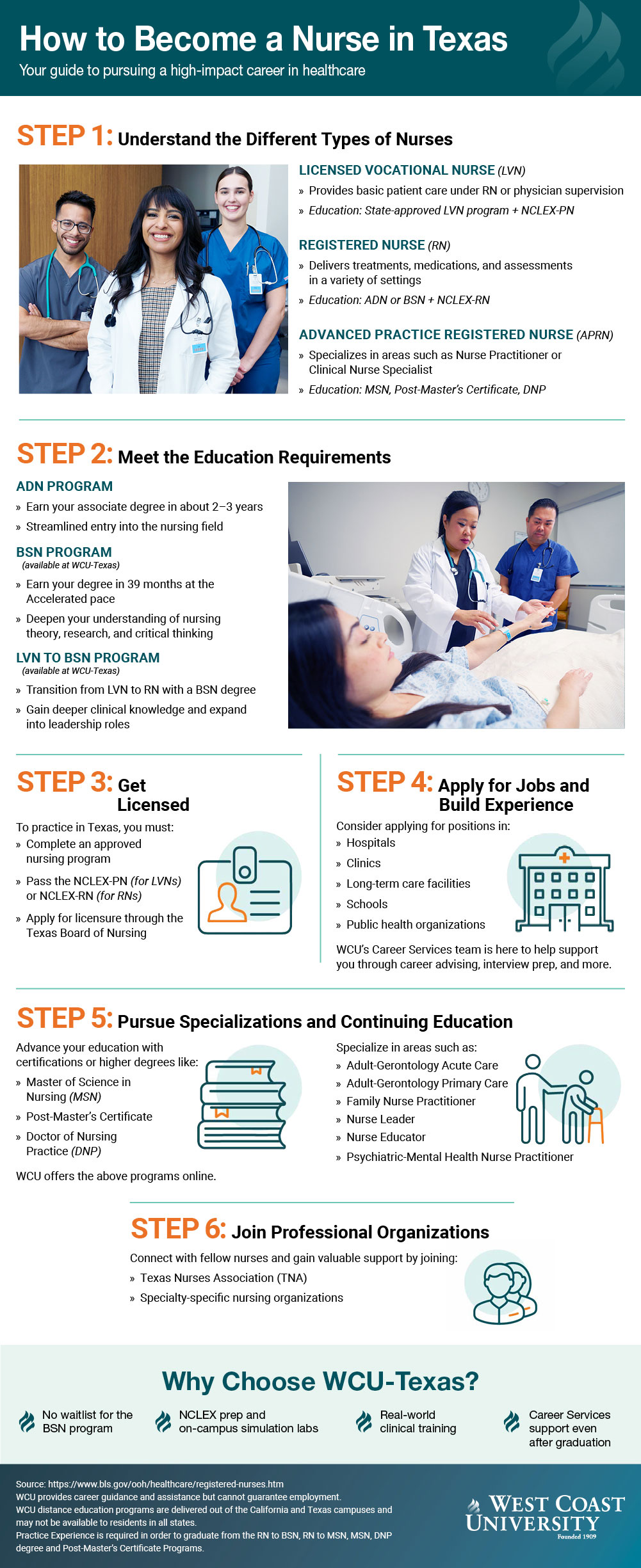How to Become a Nurse in Texas


Embarking on a career in nursing can be both rewarding and challenging, as nurses play a crucial role in providing compassionate care and support to patients. If you have a passion for helping others and a desire to make a positive impact on people’s lives, attending nursing school in Texas may be a perfect fit for you.
While there are many different pathways to becoming a nurse in Texas, this general outline can help give you a sense of what pursuing a nursing career in Texas may involve.
Understand the Different Types of Nursing Careers

Nursing is far from a monolithic career path and each role requires certain skills and responsibilities. Just as there are many different types of nurses, there are numerous paths you can take to become a nurse. Some common roles include:
Licensed Vocational Nurse (LVN): LVNs provide basic patient care under the supervision of registered nurses (RNs) or physicians. Responsibilities typically include monitoring patients’ health by checking their vitals, reporting on patients’ status, and helping patients bathe/dress.
Registered Nurse (RN): RNs are responsible for administering treatments, medications, and patient assessments. They play a critical role in patient care and work in various healthcare settings. To become an RN, you must pass the National Council Licensure Examination for Registered Nurses (NCLEX-RN). More on that later.
Advanced Practice Registered Nurse (APRN): APRNs have earned additional qualifications and education, allowing them to specialize in areas such as nurse practitioners, nurse anesthetists, clinical nurse specialists, and nurse midwives.
Meet the Educational Requirements
To become a nurse in Texas, you must meet the educational requirements for the nursing role you wish to pursue:
To become an LVN, you must complete a state-approved LVN program, which typically takes around 12 to 18 months. After completing the program, you need to pass the National Council Licensure Examination for Practical Nurses (NCLEX-PN).
Similar to how the NCLEX-PN is designed to assess the knowledge and skills of aspiring LVNs, the NCLEX-RN evaluates the competence of individuals seeking to become RNs. To prepare to pass the NCLEX-RN and become an RN in Texas, there are three main educational pathways:
- Associate Degree in Nursing (ADN) program: This program usually takes around 2-3 years. ADN programs generally focus on core nursing concepts and practical skills, making them a quicker entry point into the nursing profession than other paths are.
- Bachelor of Science in Nursing (BSN) program: A BSN program typically takes 4 years to complete and offers a comprehensive education. BSN graduates often have a deeper understanding of nursing theory, research, and critical thinking, positioning them for diverse career opportunities and potential for leadership roles within the healthcare system.
- LVN to BSN program: By seamlessly transitioning into a Bachelor of Science in Nursing (BSN) program, LVNs can equip themselves with a deeper understanding of core nursing competencies, ultimately paving the way for broader career prospects and enhanced patient care as licensed RNs.
Many Texas nursing programs, like those at WCU, offer hands-on experience to help you excel in real-world clinical settings.

Obtain State Licensure
Regardless of the nursing career path you choose, you must obtain a license from the Texas Board of Nursing to become a nurse in Texas. For LVNs and RNs, this involves passing the NCLEX-PN or NCLEX-RN respectively. View our comprehensive NCLEX-RN guide to learn more about what to expect on the exam.

Continuing Education and Specializations
Nursing is a dynamic field that constantly evolves with advancements in healthcare. Continuing education helps nurses stay up-to-date with the latest practices and technologies. Many nurses pursue specialized certifications and advanced degrees, such as a Master of Science in Nursing (MSN) or a Doctor of Nursing Practice (DNP).

Apply for Jobs and Build Experience
Once licensed, you can start applying for nursing positions in hospitals, clinics, long-term care facilities, schools, and other healthcare settings. Gaining practical experience in different areas will help you identify your passion and strengths within the nursing field.
For nursing job interview tips and other guidance, browse our career development articles.
Join Professional Organizations
Consider joining nursing associations and organizations in Texas, such as the Texas Nurses Association (TNA) or specialty-specific organizations. These associations offer networking opportunities, resources, and support to advance your nursing career.

WCU Supports You on Your Path to Becoming a Nurse in Texas!
Becoming a nurse requires dedication, hard work, and a desire to make a difference in people’s lives. The journey to becoming a nurse can be challenging, but the rewards of providing compassionate care and contributing to the health and well-being of others make it all worthwhile. WCU-Texas provides you with a tight-knit community that supports your academic and personal growth.
Our Career Services team is here to help long after you’ve graduated. Schedule an info session and learn more on our Texas BSN program to start your nursing journey.
Infographic: How to Become a Nurse in Texas

Download the Infographic: How to Become a Nurse in Texas
Start your path toward a meaningful career in healthcare with this step-by-step infographic.
- Explore different nursing roles
- Learn what education you’ll need
- Understand Texas licensing requirements and exams
- Discover specializations and continuing education options
- Get tips for finding your first nursing job and building your network
Equip yourself with the knowledge needed to make an informed decision about your education.
Request Info
- Flexible online and campus programs
- 65,000 alumni across the globe
- Experienced faculty and staff